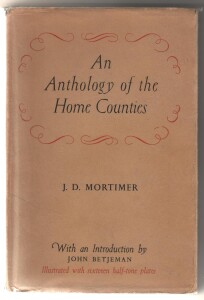 Even today, thirty six years after his death, John Betjeman can still surprise us with his wisdom and original mind. In 1947, less than two years after the end of a war that brought the prospect of a radiation death to the innocent citizens of Great Britain, destroyed some of finest Georgian terraces in London and Bath, that peppered landmark buildings, including St Paul’s Cathedral and the Dulwich Art Gallery with shrapnel, and pock-marked the pastoral landscapes of Surrey, Middlesex and Essex, the editors at Methuen asked the rising poet of the suburbs to provide an Introduction to their new anthology by someone called J. D. Mortimer ( who he?) on the Home Counties.
Even today, thirty six years after his death, John Betjeman can still surprise us with his wisdom and original mind. In 1947, less than two years after the end of a war that brought the prospect of a radiation death to the innocent citizens of Great Britain, destroyed some of finest Georgian terraces in London and Bath, that peppered landmark buildings, including St Paul’s Cathedral and the Dulwich Art Gallery with shrapnel, and pock-marked the pastoral landscapes of Surrey, Middlesex and Essex, the editors at Methuen asked the rising poet of the suburbs to provide an Introduction to their new anthology by someone called J. D. Mortimer ( who he?) on the Home Counties.
Betjeman duly obliged and what he wrote is redolent of his unique perspective on southern England. A writer of an earlier generation—a Walter-de-la Mare, a Blunden, a S. P. B.Mais say—would have come up with the usual nostalgic picture of the Home Counties as places of elm-shaded inns, haystacks, cricket on the green and dusty lanes, and left it at that, but Betjeman while regretting that much of Middlesex and parts of Surrey were now unrecognisable from their nineteenth and early twentieth century appearance, thanks to the depredations of the car, , and the presence in the sky of the aeroplane, suggests that the melancholy induced by such realisations could be assuaged by an anthology that celebrates the appeal of the suburbs
The Home Counties of the L.P.T.B. and the Southern Electric and Green Line buses, of Ritz cinemas and multiple stores and trim building estates must have this literature. There has been little poetry of the suburbs, possibly because they are so raw and new. But since the suburbs are there for as long as atomic energy will allow them, and since there are still poets , they will be eventually turned into poetry so that we can enjoy urban Gidea Park as once Hood enjoyed countrified Epping. Already much prose has appeared which has glorified the suburbs into something beautiful—Gissing, Machen, W.B.Maxwell were pioneers of suburban descriptive prose. Suburban social life at the end of the last century has been immortalised by George and Weedon Grossmith in the Diary of a Nobody.
In 1947 no-one but Betjeman could have made such a suggestion, and indeed he would have been the ideal person to have compiled the sort of anthology that he wanted to see. Unfortunately, he never got around to it, or more likely, no enterprising publisher, as far as we know, approached him with the idea, or if they did, offered him insufficient money to do the job. In any case, after 1948, when his hugely best-selling Collected Poemslaunched him into becoming ( in the words of Geoffrey Grigson) ‘ a pop star of the middle classes ‘, Betjeman had other fish to fry.
Betjeman also used his Introduction to settle a few scores. Grigson, for instance. Let us return to him. While editing New Versein the ‘thirties Grigson had rejected a poem or poems by Betjeman, who in a fit of pique had ‘climbed from his house in Uffington and cursed him from the backside of the White Horse ‘ ( Geoffrey Grigson, Recollections, 1984) . Later, in a review, Grigson had made it quite clear that he regarded Betjeman as a comic versifier pretending to be a modernist poet. He reiterated these objections in Recollections, his final book, which Betjeman probably read. But back in 1947, despite the fact that Grigson and he had shared a BBC studio together in 1938 and moreover a few years later seemed to be getting on well while Grigson was a BBC Talks Producer in Bristol, Betjeman was evidently still smarting from the earlier rebuffs. Here is what he said about the three sorts of anthology:
‘…the most irritating of which is that which is designed to illustrate the various ‘ movements ‘ in English literature—Metaphysical, Augustan, Romantic, Georgian and so on. They are generally compiled by hacks and used in schools…’
It just so happened that in 1942 Grigson had published his ground-breaking anthology of Romantic writing, which was followed in 1946 by his Before the Romantics, which focussed on Augustan, ‘Georgian’ and Metaphysical material. Touche ! Evidently Betjeman much preferred anthologies that were ‘ interesting because of the personal taste of their compilers ‘ –people like Yeats, Thomas Campbell and Robert Bridges—but in 1947 Grigson would have been seen by many readers as having interesting ‘ tastes ‘ in both poetry and prose, so it is odd that Betjeman couldn’t ( or wouldn’t) see beyond his personal grudges to accord him this credit. [RR]
